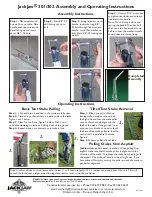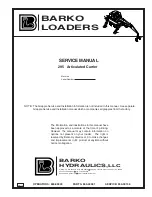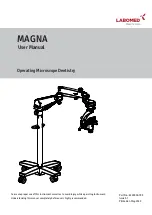
MDX [en-US]
35
9.2.1
Stuffing Box Packing
Stuffing box packing is the actual sealing element in most stuffing box assemblies. It experiences considerable friction and will
have a limited lifespan. Proper maintenance procedures are essential to avoid premature failure, wear and corrosion to nearby
parts, mechanical end contamination and unnecessary downtime. The following provides an introduction to packing basics.
Refer to your GIW Pump Maintenance Manual, GIW / KSB representative and/or packing supplier for further detail.
The packing type must be compatible with your pumping application. This includes pressure, temperature, pH and solids content.
Seal water quality can also affect packing selection. Refer to your Bill of Materials for the packing type supplied with your pump
or contact your GIW / KSB representative if a change in packing type is needed.
Summary of standard GIW packing types:
Tuf-Pak 100
Vegetable fiber packing impregnated
with PTFE for moderate temperature,
pressure and pH.
Tuf-Pak 300
Continuous filament polyimide and
PTFE yarns for high temperature or
pressure and wide range of pH.
Tuf-Pak 500
Graphite particles in an expanded
PTFE matrix plus aramid corner braid
for high pressure application with hot
and/or poor quality seal water.
Tuf-Pak 400
Graphite particles in an expanded
PTFE matrix for extreme chemical
service and grease lubricated expeller
seals.
Tuf-Pak 600
Heat resistant, thermoset fiber for most
applications. Commonly supplied with
SpiralTrac™ assemblies
9.2.2
Stuffing Box Assembly
CAUTION
Failure to center the stuffing box may result in greatly reduced service life for the packing and shaft sleeve.
The stuffing box should be mounted so that the sealing water tap is on or near the horizontal centerline. This will position the
gland studs at 9 o’clock and 3 o’clock for easy access on smaller shaft sizes. Note that the small stuffing boxes have a single
inlet while the larger sizes have a second port that can be used for additional flow or have a pipe plug installed.
Clearance is provided between the stuffing box rabbet fit and the pedestal to allow centering of the stuffing box to the shaft
sleeve. During installation, the packing space should be equalized to within 0.25 mm (.010") at all locations before fully tightening
the stuffing box flange bolts.
In some cases, a separate stuffing box wear plate may be provided. This should be fastened into place with a fresh gasket.
9.2.3
Stuffing Box Maintenance
The stuffing box is equipped with tapped holes for sealing water located 180° apart. Either tap can be used; however,
normal practice is to pipe sealing water to both taps.
In order to keep the stuffing box free from abrasive particles, the sealing water pressure and gland (452) tightness
should be adjusted to maintain a small flow of cool or lukewarm leakage out of the stuffing box. If the leakage becomes
hot, the gland should be loosened to allow a greater flow. If cloudiness is seen in the leakage, greater water pressure
is needed.
For gland flush supply, use suitable non-aggressive clean water not liable to form deposits and not containing
suspended solids. Hardness should average 5 with a pH > 8. It should be conditioned and neutral with regards to
mechanical corrosion.
An Inlet Temperature of 10 °C - 30 °C (50 °F - 85 °F) should produce a maximum Outlet Temperature 45 °C (115 °F)
when the gland is properly adjusted.
The sealing water pressure required to maintain satisfactory stuffing box operation will vary with pump operating
pressure, slurry properties, condition of the packing, and the type of stuffing box. A supply pressure of 10 psi (0.7 bar)
over the discharge pressure of the pump should be available. In most cases, adjustments to supply pressures can be
made with a manual valve and gauge near the stuffing box.
Flow Control Option
The KE stuffing box is a Low Flow design and must be pressure controlled. Flow control can result in burning or jamming
the packing. Actual flow in a properly maintained and adjusted stuffing box is considerably less than shown in the Table.
Summary of Contents for GIW MDX
Page 53: ...MDX en US 53 14 Notes...
















































